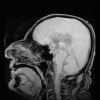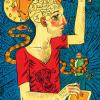Nat Prod Res. 2008 Nov;22(16):1472-1482.
Effect of Convulvulus pluricaulis Choisy. on learning behaviour and memory enhancement activity in rodents.
Nahata A, Patil UK, Dixit VK. Department of Pharmaceutical Sciences, Dr. Hari Singh Gour Vishwavidyalaya, Sagar, M.P., India.
The present study was undertaken to investigate the effects of Convulvulus pluricaulis (CP), considered as Shankhpushpi on learning and memory in rodents. Nootropic activity using Cook and Weidley's Pole Climbing Apparatus, passive avoidance paradigms and active avoidance tests were used to test learning and memory. The ethanolic extract of CP and its ethyl acetate and aqueous fractions were evaluated for their memory enhancing properties. Two doses (100 and 200 mg kg(-1) p.o.) of the ethanolic extract and ethyl acetate and aqueous fractions were administered in separate groups of animals. Both the doses of all the extracts of CP significantly improved learning and memory in rats. Furthermore, these doses significantly reversed the amnesia induced by scopolamine (0.3 mg kg(-1) i.p.). Nootropic activity was compared using piracetam as the standard. Moreover, CP has exhibited potent memory-enhancing effects in the step-down and shuttle-box avoidance paradigms. Further studies are necessitated to identify the exact mechanism of action.
Does anyone have any experience with this potential nootropic? The phrase "significantly improved learning and memory" piques my interest.
Edited by czukles, 23 November 2008 - 05:35 PM.





















































